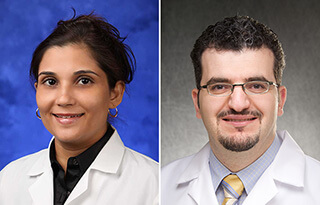March 23, 2021:
Analysis from the Big Ten Cancer Research Consortium metastatic urothelial carcinoma (mUC) phase 1b study, BTCRC-GU16-051, shows the combination of eribulin mesylate and avelumab is safe and demonstrates efficacy signals that warrant further evaluation in adults with cisplatin-ineligible mUC. In their report, published in European Urology Focus, researchers also noted that the treatment combination was better tolerated and efficacious at lower doses of eribulin mesylate.
Monika Joshi, MD, MRCP (pictured left), of Penn State Cancer Institute, led the study in collaboration with Yousef Zakharia, MD (pictured right), of the University of Iowa Holden Comprehensive Cancer Center.
Six patients with mUC who were cisplatin-ineligible and treatment naïve or platinum resistant were treated with eribulin mesylate and avelumab, using a 3 + 3 design. No dose-limiting toxicity (DLT) was observed in cohort 0 (3 subjects), whereas two DLT events were observed in cohort +1 (3 subjects). Two patients in cohort 0 had a partial response that was durable, with one patient having a durable response for 7.8 months. Disease control was observed in 4 of 6 patients (66.7%). Correlative analysis included PD-L1 expression on T cells in peripheral blood and in tumor cells, and tumor DNA sequencing.
The open-label study ended prematurely when the free study drug became unavailable. As a result, maximum tolerated dose could not be determined. Investigators say further research is warranted given their findings.
“This study is another example of successful collaboration across Big Ten CRC centers in designing and executing innovative clinical trials,” Dr. Zakharia said. “While the study closed prematurely due to withdrawal of one of the experimental drug supplies, nevertheless we learned tremendously from this experience, and the preliminary data generated is worth further vetting in other studies.”
“This is a small study that gave us some hypothesis-generating data about safety and efficacy signals with low dose chemotherapy and avelumab despite it’s early termination,” Dr. Joshi said. “We had chosen a different regimen of eribulin when combining with avelumab and it was good to see that some patients on the study benefited from this. Additionally, we also observed efficacy signals in our FGFR patients. We hope to study the efficacy of low-dose chemotherapy with check point inhibitors in future bladder cancer clinical trials.”
Study authors included: Monika Joshi1, Sheldon L. Holder1, Junjia Zhu2, Hong Zheng1, Shraddha Komanduri1, Joshua Warrick3, Hesham Yasin4, Rohan Garje4, Bei Jia1, Joseph J. Drabick1, David J. DeGraff3, and Yousef Zakharia4; 1Department of Medicine, Division of Hematology-Oncology, Penn State Cancer Institute; 2Department of Public Health Services, Penn State Health Milton S. Hershey Medical Center; 3Department of Pathology, Pennsylvania State University College of Medicine; 4Department of Hematology-Oncology, Holden Comprehensive Cancer Center, University of Iowa Hospitals and Clinics.
About the Big Ten Cancer Research Consortium: The Big Ten Cancer Research Consortium was created in 2013 to transform the conduct of cancer research through collaborative, hypothesis-driven, highly translational oncology trials that leverage the scientific and clinical expertise of Big Ten universities. The goal of the Big Ten Cancer Research Consortium is to create a unique team-research culture to drive science rapidly from ideas to new approaches to cancer treatment. Within this innovative environment, today’s research leaders collaborate with and mentor the research leaders of tomorrow with the unified goal of improving the lives of all patients with cancer.
About the Big Ten Conference: The Big Ten Conference is an association of world-class universities whose member institutions share a common mission of research, graduate, professional and undergraduate teaching and public service. Founded in 1896, the Big Ten has sustained a comprehensive set of shared practices and policies that enforce the priority of academics in the lives of students competing in intercollegiate athletics and emphasize the values of integrity, fairness and competitiveness. The broad-based programs of the 14 Big Ten institutions will provide over $200 million in direct financial support to more than 9,800 students for more than 11,000 participation opportunities on 350 teams in 42 different sports. The Big Ten sponsors 28 official conference sports, 14 for men and 14 for women, including the addition of men’s ice hockey and men’s and women’s lacrosse since 2013. For more information, visit www.bigten.org.

















Subscribe to the Big Ten CRC Newsletter X
X Facebook
Facebook YouTube
YouTube